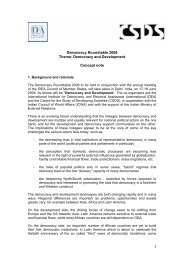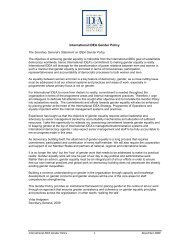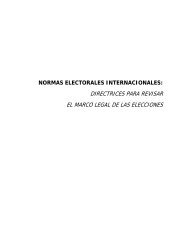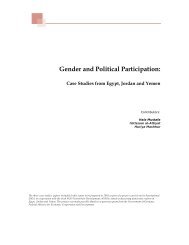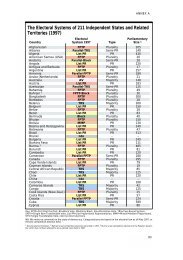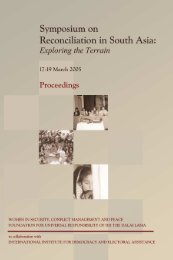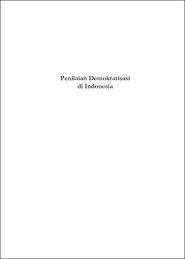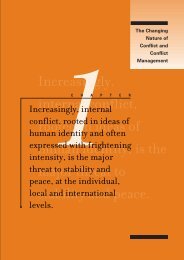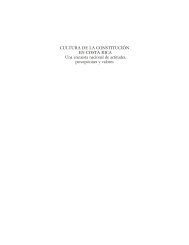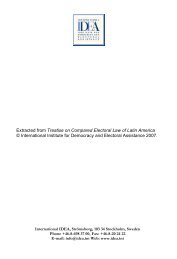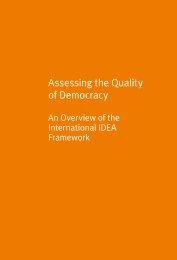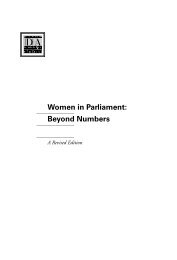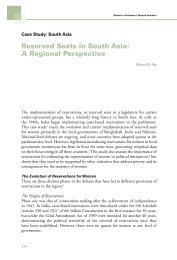The Role of State Constitutions in Protecting ... - International IDEA
The Role of State Constitutions in Protecting ... - International IDEA
The Role of State Constitutions in Protecting ... - International IDEA
Create successful ePaper yourself
Turn your PDF publications into a flip-book with our unique Google optimized e-Paper software.
agreement among all forces with<strong>in</strong> the democracy movement that federalism was<br />
the common goal 9 .<br />
It can be said that apart from the military, there is currently a broad consensus<br />
among political actors <strong>in</strong> Burma with regard to the spirit <strong>of</strong> the Panglong Accord<br />
and a consensus to rebuild the country as a democratic, federal Union.<br />
Although there is a broad consensus regard<strong>in</strong>g the future Union <strong>of</strong> Burma as a<br />
federal state, the ethnic nationalities faces the challenge, firstly, <strong>of</strong> understand<strong>in</strong>g<br />
federalism – specifically, whether a federation is a union <strong>of</strong> territories or a union<br />
<strong>of</strong> ethnic segments. It rema<strong>in</strong>s ambiguous and there is currently widespread<br />
confusion <strong>in</strong> this regard.<br />
<strong>The</strong> answer, based on the Panglong Accord, would be that federation <strong>in</strong> Burma is<br />
about the union <strong>of</strong> territories, not <strong>of</strong> ethnic societies or segments. Furthermore, a<br />
federation or federalism is a system <strong>of</strong> shar<strong>in</strong>g power and divid<strong>in</strong>g jurisdiction<br />
between and among territorial components mak<strong>in</strong>g up the union or federation.<br />
In other words, a federation is about how different territorial entities will relate to<br />
one another with<strong>in</strong> a larger nation-state configuration.<br />
<strong>The</strong> essence <strong>of</strong> federation or federalism is the equality <strong>of</strong> constituent members,<br />
one where there is no Mother <strong>State</strong> dom<strong>in</strong>at<strong>in</strong>g and controll<strong>in</strong>g other member<br />
states. And also, it is one where the national or federal government and legislature<br />
is not biased or weighted <strong>in</strong> favor <strong>of</strong> one member state, but is formed to promote<br />
the welfare and security <strong>of</strong> the union or the federation as a whole and by<br />
extension, the people as a whole. <strong>The</strong> national or federal government does not<br />
“possess” a specific piece <strong>of</strong> territory – to which and for which it is ma<strong>in</strong>ly<br />
responsible.<br />
This leads to the challenge: How to def<strong>in</strong>e ethnic equality and rights <strong>in</strong> the<br />
context <strong>of</strong> federalism? Do they have a place <strong>in</strong> federalism?<br />
<strong>The</strong>se questions are important for the ethnic nationalities because no constituent<br />
state <strong>in</strong> Burma is ethnically homogenous. <strong>The</strong>y are all multi-ethnic. Even <strong>in</strong> the<br />
most ethnically homogeneous state – the Ch<strong>in</strong> and the Karenni <strong>State</strong> – there are<br />
to be found dialect groups that are quite different from one another <strong>in</strong> vary<strong>in</strong>g<br />
degrees.<br />
Furthermore, the aspiration for ethnic equality has been unleashed <strong>in</strong> the course <strong>of</strong><br />
events that transpired. <strong>The</strong> resistance to state where the military monopolized<br />
power has come from ethnic-based constituent states and the language <strong>of</strong> ethnicity<br />
has been widely employed by ethnic-based resistance movements to rally followers<br />
and legitimize the cause. <strong>The</strong> demand for ethnic equality will therefore have to be<br />
dealt with by the ethnic nationalities leaders and other political actors <strong>in</strong> Burma.<br />
9) This refers to the 1990 Bo Aung Gyaw Street Declaration between the NLD (National League for Democracy) and the<br />
UNLD (United Nationalities League for Democracy) to establish a democratic federal Union, and the 1991 Manerplaw<br />
Agreement between the NCGUB (National Coalition Government <strong>of</strong> the Union <strong>of</strong> Burma) and ethnic nationalities armed<br />
resistance organizations.<br />
16



